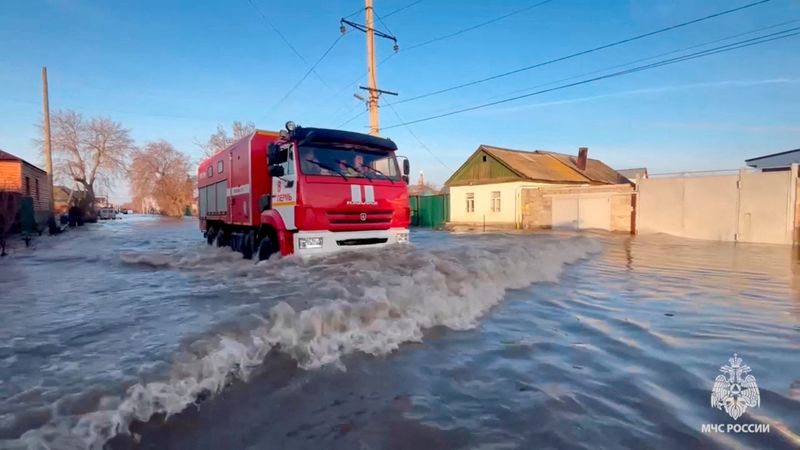By Guy Faulconbridge and Felix Light
MOSCOW (Reuters) – Floodwaters rose in two towns in Russia’s Ural Mountains on Sunday after Europe’s third-longest river burst a dam, flooding at least 6,000 homes and forcing thousands of people to flee with only their pets and few personal effects.
Some of the worst floods in decades have hit a number of Russian regions in the Ural Mountains and Siberia, along with parts of neighboring Kazakhstan in recent days.
The Ural River, which rises in the Ural Mountains and flows into the Caspian Sea, swelled several meters in a few hours on Friday as the water melted, breaking a dam embankment in the 1,800 km (1,100 mile) city of Orsk. east of Moscow. .
More than 4,000 people were evacuated in Orsk while areas of the city of 230,000 were flooded. Footage released by the Emergencies Ministry showed people wading through neck-deep water, rescuing abandoned dogs and traveling along flooded roads in boats and canoes.
State news agency TASS reported that six adults and three children had been hospitalized in Orsk, but their conditions were not life-threatening.
President Vladimir Putin ordered Emergencies Minister Alexander Kurenkov to travel to the region. The Kremlin said on Sunday that floods were now inevitable also in the Ural region of Kurgan and the Siberian region of Tyumen.
Putin spoke by telephone with regional governors, the Kremlin said.
In the city of Kurgan, which has a population of 310,000, authorities ordered residents of a riverside neighborhood to urgently evacuate, saying flood waters would soon reach the city.
Orenburg Region Governor Denis Pasler said the floods were the worst to hit the region since records began.
He said flooding had been recorded along the entire course of the 2,400 km (1,500 mile) Ural River, which flows through the Orenburg region and then through Kazakhstan to the Caspian Sea.
Russian media cited authorities in the Orenburg region as estimating the cost of flood damage locally at around 21 billion rubles ($227 million) and saying the flood waters would only dissipate after 20 April.
In Kazakhstan, President Kassym-Jomart Tokayev said Saturday that the floods represent his country’s largest natural disaster in terms of scale and impact in 80 years.
North Korean leader Kim Jong Un expressed solidarity with Putin over the flooding, state media KCNA reported, underscoring stronger ties between Moscow and Pyongyang after the leaders met last year.
“Our people will always be with the Russian people,” Kim said.
‘THE LEVEL WILL ONLY INCREASE’
Flood warnings have been issued in other Russian regions and Kurenkov said the situation could worsen very quickly.
“The water is coming and in the next few days its level will only increase,” said Sergei Salmin, mayor of Orenburg, a city of at least 550,000 people. “The flood situation remains critical.”
Emergencies Minister Kurenkov said bottled water and mobile treatment plants were needed, while local health officials said hepatitis A vaccinations were being carried out in flooded areas.
Local officials said the Orsk Dam was built for a water level of 5.5 meters (18 feet), while the Ural River rose to 9.6 meters (31.5 feet).
Federal investigators have opened a criminal case for negligence and violations of safety rules during the 2010 construction of the dam, which prosecutors said had not been properly maintained.

The Orsk oil refinery suspended work on Sunday due to flooding. Last year, the Orsk refinery processed 4.5 million tons of oil.
($1 = 92.5080 rubles)